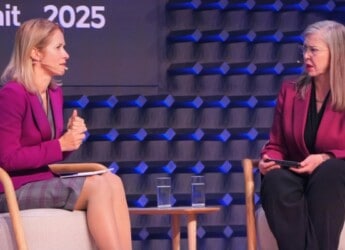Editor’s Note: In a groundbreaking development poised to reshape the landscape of artificial intelligence, Anthropic’s Claude 3 family of language models heralds a new era in the field, presenting a formidable challenge to established AI giants like OpenAI and Google. With its advanced multimodal capabilities, Claude 3 – comprising models Opus, Sonnet, and Haiku – pushes the boundaries of what AI can achieve in processing and analyzing multidimensional data. This leap forward is not just a technological marvel but a testament to Anthropic’s dedication to safety and ethical AI development, aligning closely with human values while expanding the frontiers of AI’s potential applications across various industries. As this AI power shift unfolds, cybersecurity, information governance, and eDiscovery professionals are poised to witness and partake in the transformative impacts of these advancements, navigating through the opportunities and challenges they present in the realms of data analysis, decision-making, and beyond.
Content Assessment: The Rise of Claude 3: Anthropic's Bold Challenge to AI Titans
Information - 94%
Insight - 92%
Relevance - 91%
Objectivity - 91%
Authority - 92%
92%
Excellent
A short percentage-based assessment of the qualitative benefit expressed as a percentage of positive reception of the recent article from ComplexDIscovery OÜ titled, "The Rise of Claude 3: Anthropic's Bold Challenge to AI Titans."
Industry News – Artificial Intelligence Beat
The Rise of Claude 3: Anthropic’s Bold Challenge to AI Titans
ComplexDiscovery Staff
An AI power shift is in progress, and Anthropic, having amassed significant investments from tech giants, stands at the forefront with its newly unleashed Claude 3 family of language models. This groundbreaking development has sparked vigorous debates within the technical community as the Claude 3 series, comprising Opus, Sonnet, and Haiku models, threatens to eclipse the prowess of established AI entities like OpenAI’s GPT-4 and Google’s Gemini.
Seeking to enhance AI’s analytical capability across multidimensional data, Anthropic has achieved a remarkable feat with Claude 3. Dubbed multimodal, these models can deftly navigate through text, images, and even complex diagrams, unlocking new potential in AI-assisted analysis and forecasting. Claude 3 Opus has particularly captivated the tech world with its assertion of superiority in undergraduate knowledge and industry benchmarks.
Amidst this tide of advancement, safety remains paramount. Anthropic has meticulously honed its AI constitution, harmonizing with human values while pushing the technological envelope. The firm’s commitment to safety and impressive performance feats raises pivotal questions about the trajectory of AI in society.
The leap in token context windows is another highlight of the Claude 3 lineup. It exceeds those of competitors and enables machines to possess a more profound understanding of the information they process. Opus and Sonnet, the forerunners of the Claude 3 family, are now available to developers through APIs and chatbot platforms, fostering creativity and innovation in the tech landscape.
However, Claude 3’s high-end applications are not the only ones that captivate interest. Anthropic has not overlooked the significance of accessibility, with Sonnet powering a free version and Opus available through a Pro subscription. This thoughtful segmentation ensures that cutting-edge AI is within the reach of a diverse array of users and developers.
Anthropic’s ambitious roadmap stipulates continual enhancements to the Claude 3 models, hinting that we are still far from the zenith of AI model intelligence. As tech enthusiasts and professionals keenly watch these developments, one thing becomes abundantly clear: the competition is no longer a two-horse race. The entry of Claude 3 to the arena heralds the dawn of a new epoch in generative AI.
The implications of Claude 3’s emergence extend far beyond the realm of technology. As these advanced language models permeate various industries, from healthcare and finance to education and entertainment, they hold the potential to revolutionize the way we interact with information and make decisions. The ability to process and analyze vast amounts of multidimensional data in real time could lead to breakthroughs in medical research, financial forecasting, and personalized learning experiences.
Moreover, the accessibility of Claude 3 models through APIs and chatbot platforms democratizes access to cutting-edge AI technology. This could spur a new wave of innovation as developers and businesses of all sizes harness the power of these models to create novel applications and services. The potential for collaboration and knowledge-sharing across industries is immense as the barriers to entry are lowered and the playing field becomes more level.
However, as with any disruptive technology, the rise of Claude 3 also raises important ethical and societal questions. The increasing reliance on AI-generated content and decision-making processes necessitates a robust framework for ensuring transparency, accountability, and fairness. Anthropic’s commitment to safety and alignment with human values is commendable, but the broader AI community must work together to establish clear guidelines and best practices to mitigate potential risks and unintended consequences.
Furthermore, the rapid advancement of AI capabilities underscores the need for ongoing public discourse and education about the impact of technology on society. As AI becomes more integrated into our daily lives, it is crucial that individuals from all walks of life have a basic understanding of how these systems work and the ethical considerations surrounding their use. This will enable informed decision-making and ensure that the benefits of AI are distributed equitably across society.
The rise of Anthropic’s Claude 3 family of language models represents a significant milestone in the evolution of AI. The multimodal capabilities, enhanced token context windows, and accessibility of these models have the potential to transform industries, drive innovation, and reshape the way we interact with information. However, as we embrace the opportunities presented by this AI power shift, we must also grapple with the ethical and societal implications of these advancements. By fostering open dialogue, establishing clear guidelines, and prioritizing safety and alignment with human values, we can ensure that AI’s advantages are maximized for the greater good of humanity.
News Sources
- ChatGPT Competitor Anthropic Announces Claude 3
- Claude 3 launched by Anthropic — new AI model leaves OpenAI’s GPT-4 in the dust
- Amazon-Backed Anthropic Launches Claude 3 AI Models to Rival ChatGPT
- Anthropic Introduces Claude 3 AI Models, Claims Its Chatbot Outperforms GPT-4 and Gemini
Assisted by GAI and LLM Technologies
Additional Reading
- The Cost of Innovation: Generative AI’s Impact on Business and Pricing Strategies in the eDiscovery Sphere
- Prompt Engineering: The New Vanguard of Legal Tech
Source: ComplexDiscovery OÜ

























